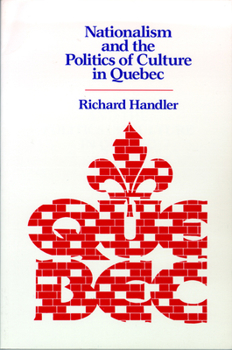Nationalism and the Politics of Culture in Quebec
Select Format
Select Condition 
Book Overview
Richard Handler's pathbreaking study of nationalistic politics in Quebec is a striking and successful example of the new experimental type of ethnography, interdisciplinary in nature and intensively concerned with rhetoric and not only of anthropologists but also of scholars in a wide range of fields, and it is likely to stir sharp controversy.
Bringing together methodologies of history, sociology, political science, and philosophy, as well as anthropology, Handler centers on the period 1976-1984, during which the independantiste Parti Qu?b?ois was in control of the provincial government and nationalistic sentiment was especially strong. Handler draws on historical and archival research, and on interviews with Quebec and Canadian government officials, as he addresses the central question: Given the similarities between the epistemologies of both anthropology and nationalist ideology, how can one write an ethnography of nationalism that does not simply reproduce--and thereby endorse--nationalistic beliefs? Handler analyzes various responses to the nationalist vision of a threatened existence. He examines cultural tourism, ideology of the Quebec government, legislations concerning historical preservation, language legislation and policies towards immigrants and "cultural minorities." He concludes with a thoughtful meditation on the futility of nationalisms.
Bringing together methodologies of history, sociology, political science, and philosophy, as well as anthropology, Handler centers on the period 1976-1984, during which the independantiste Parti Qu?b?ois was in control of the provincial government and nationalistic sentiment was especially strong. Handler draws on historical and archival research, and on interviews with Quebec and Canadian government officials, as he addresses the central question: Given the similarities between the epistemologies of both anthropology and nationalist ideology, how can one write an ethnography of nationalism that does not simply reproduce--and thereby endorse--nationalistic beliefs? Handler analyzes various responses to the nationalist vision of a threatened existence. He examines cultural tourism, ideology of the Quebec government, legislations concerning historical preservation, language legislation and policies towards immigrants and "cultural minorities." He concludes with a thoughtful meditation on the futility of nationalisms.
Format:Paperback
Language:English
ISBN:0299115143
ISBN13:9780299115142
Release Date:February 1988
Publisher:University of Wisconsin Press
Length:240 Pages
Weight:0.70 lbs.
Dimensions:0.5" x 6.1" x 9.0"
Customer Reviews
1 rating
A Confession
Published by Thriftbooks.com User , 21 years ago
Look, I am biased. I took his class in my freshman year of college. But I was a poor student who needed to fufill a humanities credit, and from the description of the course booklet, it seemed vaguely interesting. But there are a few things you need to consider about me, the reviewer:Due to my overwhelming and stupid class schedule, I was sleeping poorly and thus (since his class was in the morning) I either skipped it or slept in the back of the lecture hall. But I made sure to read this very book and attend the TA sessions.Despite my lack of time spent on the class itself, I managed to learn quite a lot of things from this book and the professor, Richard Handler.One, I learned about the contradictory nature of "perservation" and the use of assigning organic qualities to a "culture." I am sure other people can go into this with more eloquence than I can provide at the present time (particularly since I have not read the book in 6 years, but I will correct that.) I also learned about the Western chauvinism that leads people to paint "primitive cultures" as "Stone Age" and not as "Contemporary." Anyhow, buy the darn book, people. Maybe you can learn something. Or if you are going to UVA, take his class. He's a great professor. Yeah, I slept through quite a bit of his lectures, but he always managed to wake me up when he started to get angry at the injustices of the world and then he would start to curse and rant and yell. Dang, I would think. This prof really believes in his stuff. He's passionate for one thing, and I think that's a good thing in a professor, a writer, and a thinker.





